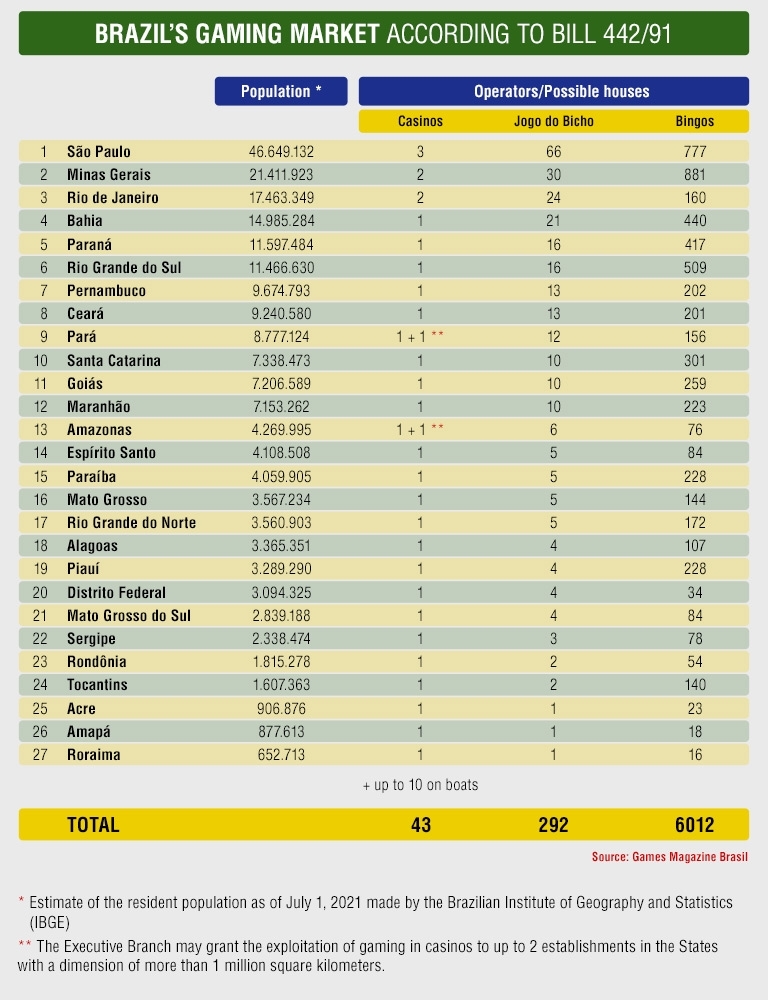

The House plenary approved, by 246 votes against 202, the basic text of the project that legalizes gambling in Brazil, such as bingos, casinos, Jogo do Bicho, turf (horse racing) and online gaming. But then, how many legalized gambling houses could Brazil have if this law were sanctioned without changes? This table created by Games Magazine Brasil arises from analyzing the scope of the approved text, without considering the possible changes that may occur in the discussion that will come in the Senate.

As marked in the base text, the table divides the modalities by state and assigns the number of possible qualifications of each one of them by the population that was calculated according to the estimate on July 1, 2021 made by the Institute Brazilian Institute of Geography and Statistics (IBGE).
Casinos
According to the text, the Ministry of Economy may authorize licenses for casinos in integrated leisure complexes and tourist casinos in the national territory: it allows one casino per state or Federal District with a population of up to 15 million inhabitants; two per state with a population between 15 and 25 million and three for states over 25 million. In practice, São Paulo will be the state that may have the largest number of casinos, with three; followed by Minas Gerais, Rio de Janeiro, Amazonas and Pará, with two.
In the case of river casinos, the following are foreseen: one establishment per river, with a length between 1500km and 2500km; two with a river between 2500km and 3500km; three, at most, when the river extends for more than 3500 km. The maximum is 10 units. These vessels may not be anchored in the same location for more than 30 consecutive days, and the concession may be for up to ten establishments.
Although 43 casinos is the number that is deduced from the guidelines of the law, this number could grow because in locations classified as centers or tourist destinations, the installation of a casino will be allowed regardless of the population density of the state in which they are located. A tourist casino cannot be located less than 100 km away from any casino integrated into a leisure complex.
The proposal defines these places as those that have regional identity, adequate infrastructure and offer of tourist services, high density of tourists and title of natural heritage of humanity, in addition to having tourism as an important economic activity.
In Brazil, there are seven areas classified as World Heritage Sites. The Iguaçu National Park, the reserves of Fernando de Noronha and Atol das Rocas, as well as complexes of protected areas in the Amazon, Pantanal, Cerrado and Atlantic Forest are Brazilian natural wonders recognized worldwide by UNESCO (United Nations Educational Organization, Science and Culture).
Jogo do Bicho
The jogo do bicho rule is limited by state, with the release of one “bicheiro” (operator) for every 700,000 inhabitants in each state. In the case of São Paulo, the state would have the right to 66 points of sale, based on current population projections by the IBGE, followed by Minas Gerais with 30 points.
Of the 27 federation units, only Acre, Amapá and Roraima could operate a single establishment. The total calculation shows that Brazil can have 292 points legalized in the country.
Bingos
Unlike the casinos and the jogo do bicho, for the installation of bingo halls the legislators chose to segment by population of each municipality and not of the entire state. A limitation is one bingo for every 150 thousand inhabitants, with 400 video bingo machines per establishment. The municipalities that have less than that number of inhabitants will correspond to a maximum of 1 establishment.
In this way it can happen that Rio de Janeiro, despite being the third state with the largest population in the country (17,463,349 inhabitants) has a limit of 160 bingo houses while Rio Grande do Norte with 3,560,903 inhabitants and the position 17 of population by state in the country, it will be able to install 172 halls. This curious fact is due to the fact that each state has a different number of municipalities and they vary their population density sensibly.
According to the table, 6,012 bingo and video-bingo rooms can be installed in Brazil in case the law passed by the deputies is sanctioned without changes. However, this number could grow, since the text also authorizes the exploitation in football stadiums with a capacity of over 15 thousand fans (the country has about 115 in this condition) and in authorized tourist entities.
Source: Exclusive GMB